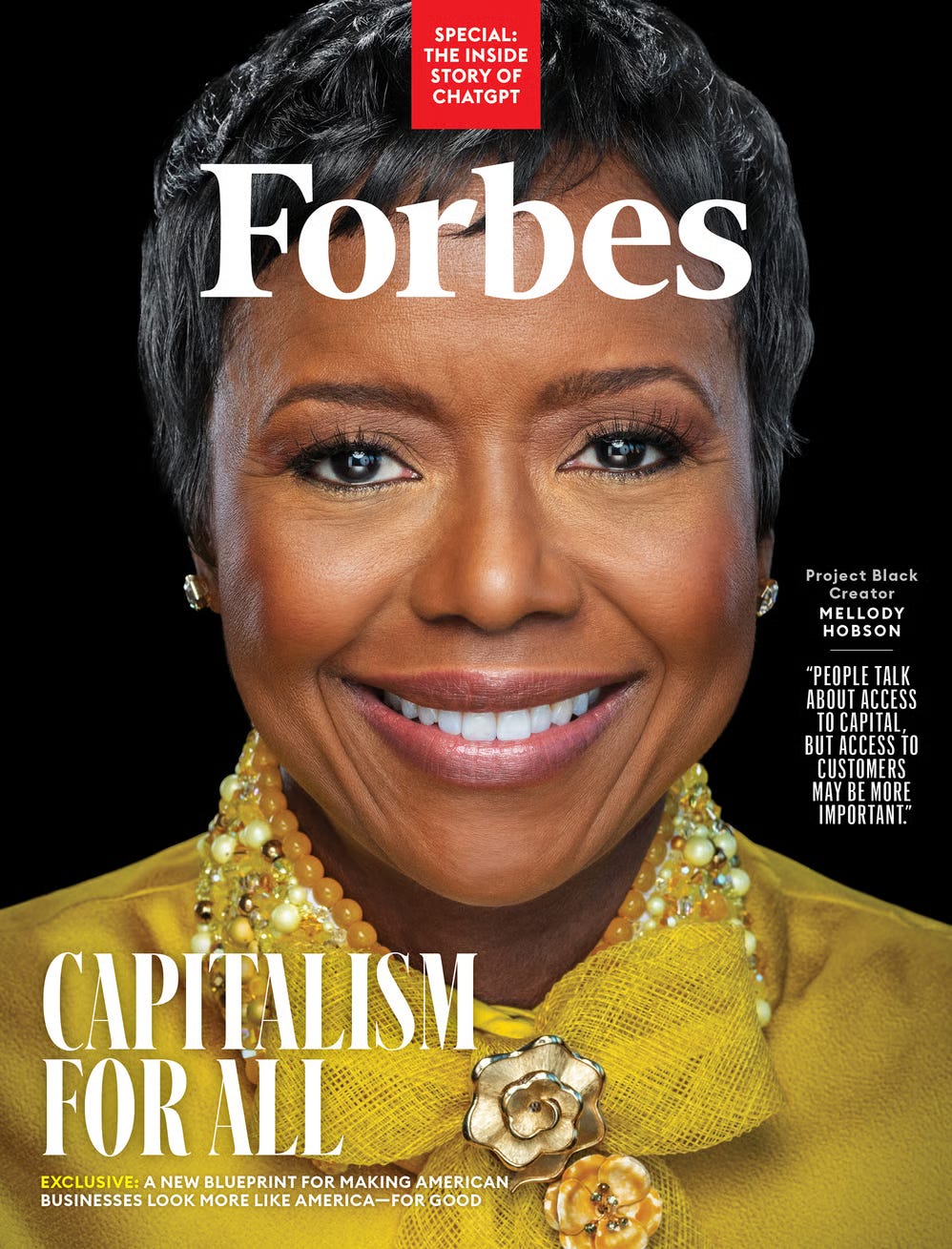Capitalism for All: Is Mellody Hobson’s Vision a Reality in the Age of AI?
A few weeks ago, I came back across Mellody Hobson’s Forbes cover titled with the bold declaration: “Capitalism for All.” It sparked a new reaction for me from the first time I read it. The phrase is deceptively simple yet deeply provocative, especially at a moment when the world feels both wildly abundant and starkly unequal.
What does “Capitalism for All” actually mean? Is it to be taken literally, that everyone will benefit equally from capitalism? Or is it more of an invitation for us to rethink how we participate in this economic system, so no one is left without the basics of a dignified life?
Who Gets to Prosper?
Hobson’s career has long symbolized the promise of access: she rose from humble beginnings to become one of the most powerful Black women in finance, chairing Starbucks and co-leading Ariel Investments. She often says her goal is to “give people permission to dream.” But a dream is not enough when systemic barriers persist and when technological disruption threatens to leave even more people behind.
This is where her vision of “capitalism for all” hits a wall for many. Because for all its potential, capitalism doesn’t distribute opportunity fairly on its own. It demands rules, oversight, and sometimes radical reimagination. Without that, the system tilts towards the few who already hold the most capital.
Enter AI, The Next Wealth Concentrator?
The rise of AI is the latest stress test for this idea. We’re already seeing entire industries upended overnight: from coders to copywriters, the tools that promise to “democratize” work often end up concentrating profit and power in the hands of those who build and own the platforms. So how do we keep AI from becoming just another engine of exclusion?
Some argue that universal basic income (UBI) is the only answer: a financial floor that ensures no one’s survival is at the mercy of technological shifts. Others see UBI as a Band-Aid that doesn’t address the root, who owns the means of production, the data, the AI models themselves?
Is Universal Income Enough?
I don’t think Hobson is necessarily calling for UBI when she says “Capitalism for All.” To me, she’s asking us to consider the moral baseline: that everyone deserves a shot at economic stability and the freedom to dream. That means access to fair wages, financial literacy, ownership stakes, and systems that don’t penalize you for where you started.
Yet, if AI does lead to mass job displacement, some form of universal income or profit-sharing will almost certainly have to be on the table. Otherwise, the gulf between the AI-haves and the AI-have-nots could make today’s wealth gaps look quaint.
From Abundance to Dignity
So, is “Capitalism for All” just a slogan? Or is it a blueprint? I choose to see it as an invitation, not to perfect capitalism but to shape it, expand it, and hold it accountable. It’s not about guaranteeing that everyone becomes a millionaire. It’s about ensuring that no one is so locked out of prosperity that they’re forced to choose between rent, food, and a future for their children.
In an age where technology generates more wealth than any of us could spend in a lifetime, not wanting for the basics shouldn’t feel like an impossible dream. It should be the bare minimum. If we can build machines that think for us, we can certainly build systems that care for us.
That’s what “Capitalism for All” means to me. The real question is: do we have the courage, and the collective will, to make it more than a headline?
What do you think? Is universal income inevitable? How do you envision capitalism for all?
More from us:
![Inside Track [by GRITS]](https://substackcdn.com/image/fetch/$s_!Ph_m!,w_80,h_80,c_fill,f_auto,q_auto:good,fl_progressive:steep,g_auto/https%3A%2F%2Fsubstack-post-media.s3.amazonaws.com%2Fpublic%2Fimages%2Fec564eb1-5e4a-4340-af7a-1ecda5dc7110_1280x1280.png)
![Inside Track [by GRITS]](https://substackcdn.com/image/fetch/$s_!UbBk!,e_trim:10:white/e_trim:10:transparent/h_72,c_limit,f_auto,q_auto:good,fl_progressive:steep/https%3A%2F%2Fsubstack-post-media.s3.amazonaws.com%2Fpublic%2Fimages%2F4ce7bcdc-716c-4ef7-a503-e464ff0e3a9c_3301x1830.jpeg)

![Inside Track [by GRITS]](https://substackcdn.com/image/fetch/$s_!Ph_m!,w_36,h_36,c_fill,f_auto,q_auto:good,fl_progressive:steep,g_auto/https%3A%2F%2Fsubstack-post-media.s3.amazonaws.com%2Fpublic%2Fimages%2Fec564eb1-5e4a-4340-af7a-1ecda5dc7110_1280x1280.png)

